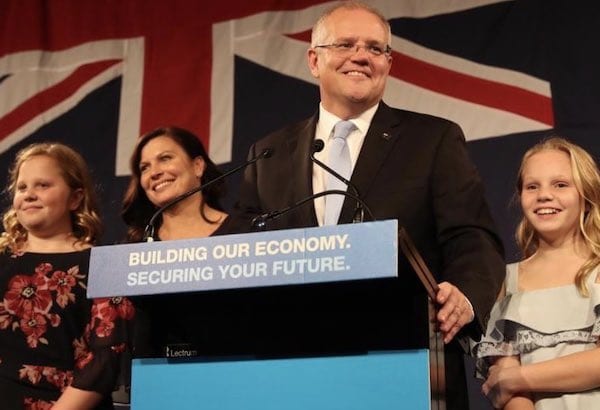Prime Minister Scott Morrison called it a “miracle”, given such a result seemed so unlikely according to the polls.
But the result is no miracle for action on climate change – nor for advancing equality, women’s representation in leadership or taking serious action on domestic violence, among other things.
According to the Women’s Electoral Lobby’s 2019 Federal Election Scorecard ranking the major political party’s commitment to women’s equality, the Coalition fell significantly short on even promising what’s needed.
The Lobby ranked each party on 12 fundamental issues affecting women’s equality, including eliminating violence against women, women’s health, an equitable taxation system, social services, vocational education and training, affordable housing, adequate retirement income, pay equality and childcare.
The Coalition’s result? It achieved just one dismal tick out of the possible 12 on on offer for its policies supporting women’s equality.
Then there’s the Liberal Party’s much discussed ‘problem with women’ — the one that saw a number of high profile women leaving the party in 2018, and Julie Bishop unable to rise to the top job, despite being the most qualified and experienced person for the role.
Still, this election has produced some bright spots for women – notably via those who managed to pick up seats.
Independent Zali Steggall successfully won the seat of Warringah, ending Tony Abbott’s 25 year run in the seat. Steggall has already declared she will be a “climate leader”, but her ability to have much sway in the lower house will depend on whether or not the Coalition wins a majority.
Another independent, Helen Haines, has picked up the seat of Indi, taking the baton from Cathy McGowan and making history in the process – becoming the first independent to succeed another in the Federal Parliament.
The race is still too close to call in Wentworth, with independent Kerryn Phelps slightly behind her Liberal rival Dave Sharma. There’s a possibility that Phelps could just hang on.
And a handful of new women will now be part of Scott Morrison’s Coalition government, with Bridget Archer winning for the Liberal party in the seat of Bass and Melissa McIntosh in the seat of Lindsay. Sarah Richards may also pick up the seat of Macquarie with the race currently too close to call, along with Gladys Liu in Chisholm.
Finally, with Bill Shorten stepping down from the leadership of the Labor party, his deputy Tanya Plibersek could potentially take the helm. She told Insiders this morning that she’s “considering” entering the race, along with Chris Bowen and Anthony Albanese. The leadership process can take weeks after the rules were changed by Kevin Rudd back in 2013, with contenders now having to win both the support of the party room and the Labor party members.
Plibersek must surely have a good chance, having served as deputy leader for six years now and having previously held a number of high profile portfolios during previous Labor governments.
But as we’ve learnt time and time again, there are no easy predictions that can be made in Australian politics.



